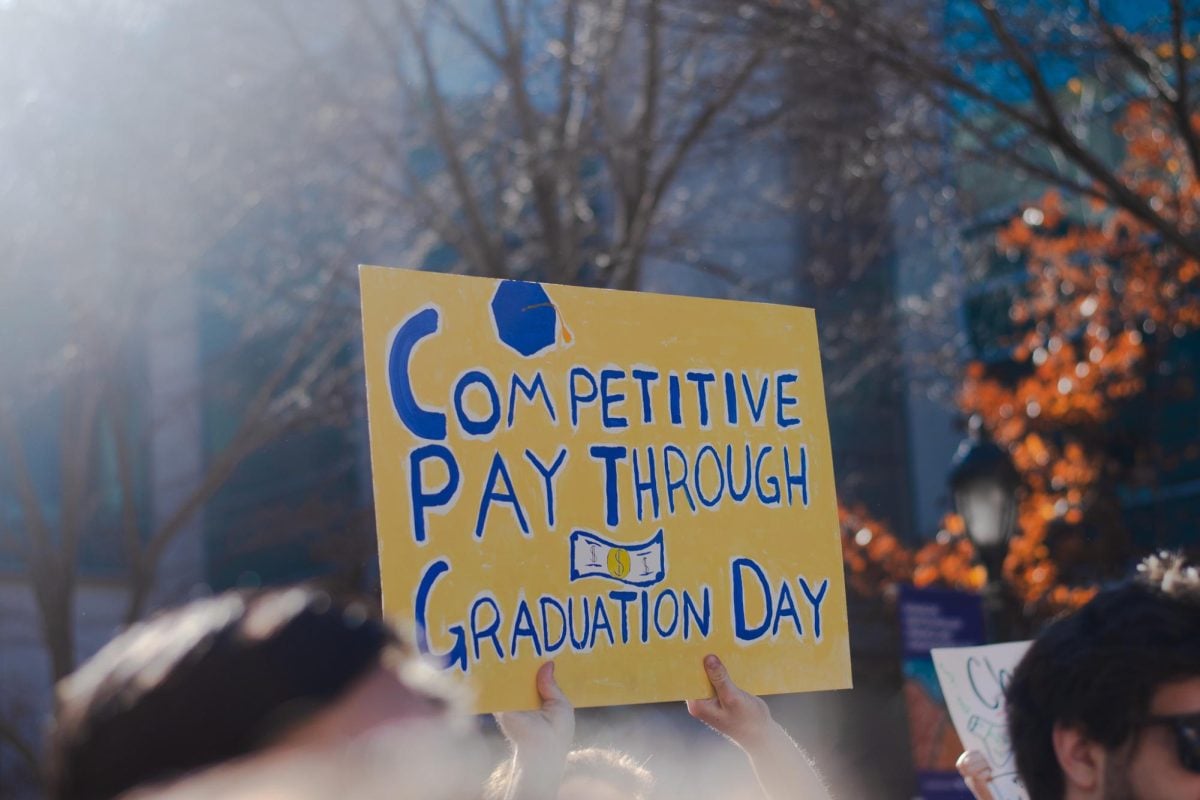Just over a year after the Northwestern University Graduate Workers received formal recognition from the University, union leaders are reflecting on what has — and hasn’t — changed.
After years of community organizing, NUGW held its first election, winning a supermajority of support to file with the National Labor Relations Board to certify the United Electrical, Radio and Machine Workers of America as its collective bargaining body in January 2023. This move also earned the union formal recognition from the University, and bargaining negotiations kicked off.
Since then, 13 bargaining sessions have been completed, with the University canceling an additional two. A University spokesperson previously told The Daily that the University canceled its Nov. 14 meeting because it needed more time to review NUGW’s economic proposals, which the union presented to the University Oct. 19.
Another University spokesperson previously told The Daily that NU canceled its Nov. 30 meeting because its lead negotiator tested positive for COVID-19 earlier in the week. She said the University extended three other bargaining sessions from half-day to full-day in light of the cancellation.
NUGW and the University have reached tentative agreements on 24 of 32 proposed articles, and seven are still in negotiation. The next session is scheduled for Feb. 1.
Peter Cummings, a third-year Ph.D. candidate in psychiatry and behavioral sciences, is a member of NUGW’s bargaining committee. He said the union makes people feel like they are a part of something.
“Academics usually tend to be pretty politically engaged, and I think for a lot of us, this is the first kind of tangible moment of participating in a participatory democracy,” Cummings said. “And I think it’s exciting.”
Cummings is one of two bargaining committee members representing the Chicago campus. He said people on the Chicago campus can feel isolated in their labs, but added the union has been able to bring people together.
Cummings said the union’s goal is ultimately to negotiate a contract as quickly as possible. After the University gives its best and final offer, the bargaining committee — and then the union at large — will vote on it.
NUGW’s bargaining sessions and interactions with the University have to abide by laws and jurisdictional rulings to remain in good standing. Union members must come to agreements directly with the University over proposals including payments of compensation, medical benefits, retirement, employee and tax assistance, tuition and fees — all of which are still being negotiated.
If members find the University’s final offer to be unsatisfactory, Cummings said the union is prepared to strike. He said the strike pledge will launch Jan. 29, and he hopes it will force the University to take their demands seriously.
“We don’t want to (strike),” Cummings said. “But if they’re not going to meet this moment right now, and realize that they have these resources and they can make this happen … we will move. But again, our goal is to get this done as quickly as possible and not strike.”
Cummings said graduate workers love their work, but they also hope to raise the standards of higher education through fair treatment and competitive pay.
The NUGW’s organizing co-chair Emma Kennedy, a sixth-year art history Ph.D. candidate, has been responsible for organizing workers and liaising with different organizers and departments to disseminate information to workers.
“I think that we all really wanted our contracts to be done in 2023,” Kennedy said. “But the University didn’t quite agree.”
Kennedy said Fall Quarter brought in the first cohort of graduate workers to jump right into a legally recognized union, causing an uptick in union membership and involvement in the last year.
“The last year has been exciting because we’ve just been continuing to grow, expand and welcome in new organizers,” she said.
Jake Cohen, a second-year Ph.D. candidate in interdisciplinary biological sciences, was elected as the union’s secretary. He said NUGW’s interaction with the University has been different since the election.
“The communication with the University has been more formalized and actual,” Cohen said. “There is more of a direct communication with the University, although it’s not always the smoothest and most respectful interaction.”
Sara Bowden, a fifth-year Ph.D. candidate in music theory & cognition, was one of NUGW’s co-chairs during the election. They said their participation in the union has been the most meaningful part of their time at NU.
Bowden said it felt “awesome” to step into a union-protected job the day after the election.
“The whole election showed us that when we all come together, through small conversations, and through meetings and town halls, we can create a lot of change that will benefit every single person on campus,” Bowden said.
Email: [email protected]
X: @SQPowers04
Email: [email protected]
X: @Jerrwu
Related Stories:
— NU Graduate Workers reach three tentative agreements
— NU Graduate Workers marches across campus, issues deadline for union recognition






